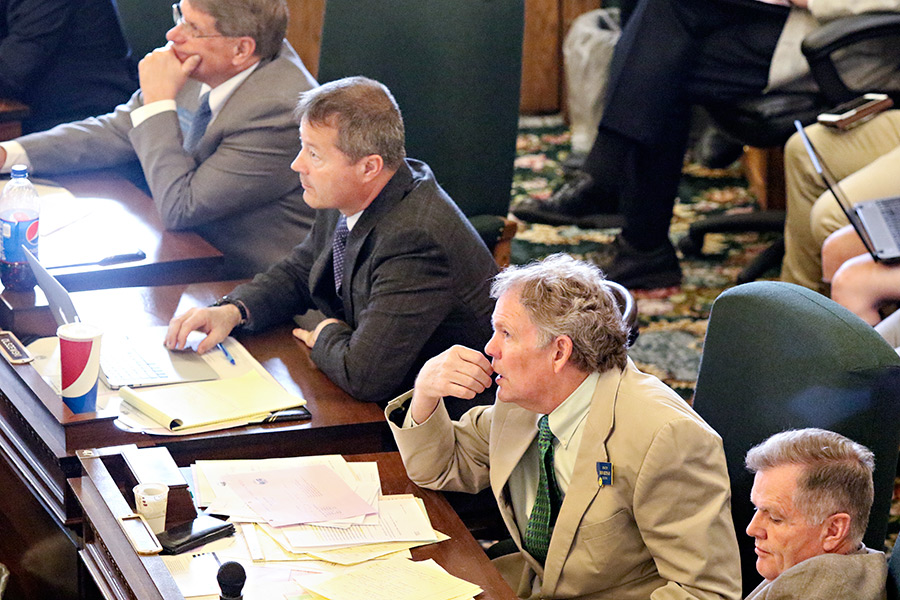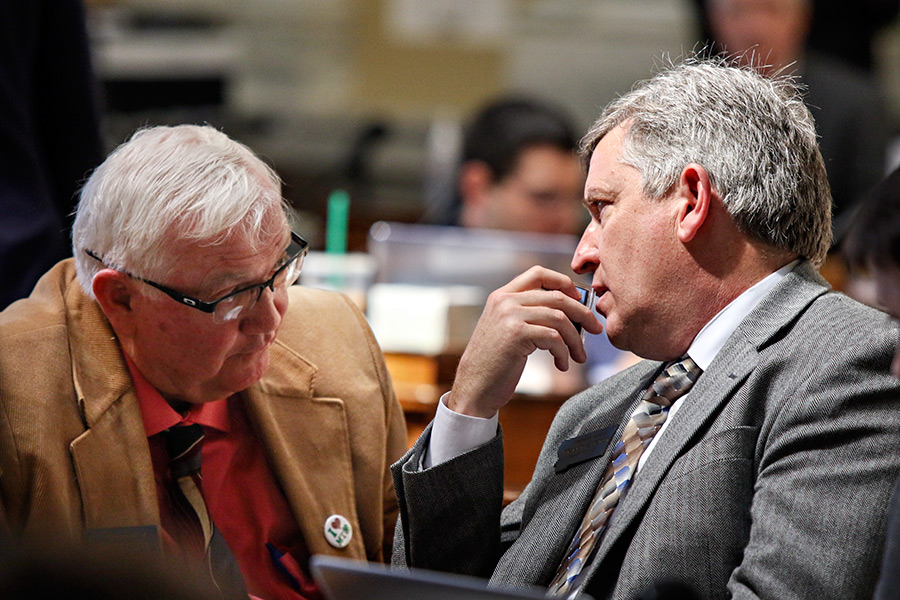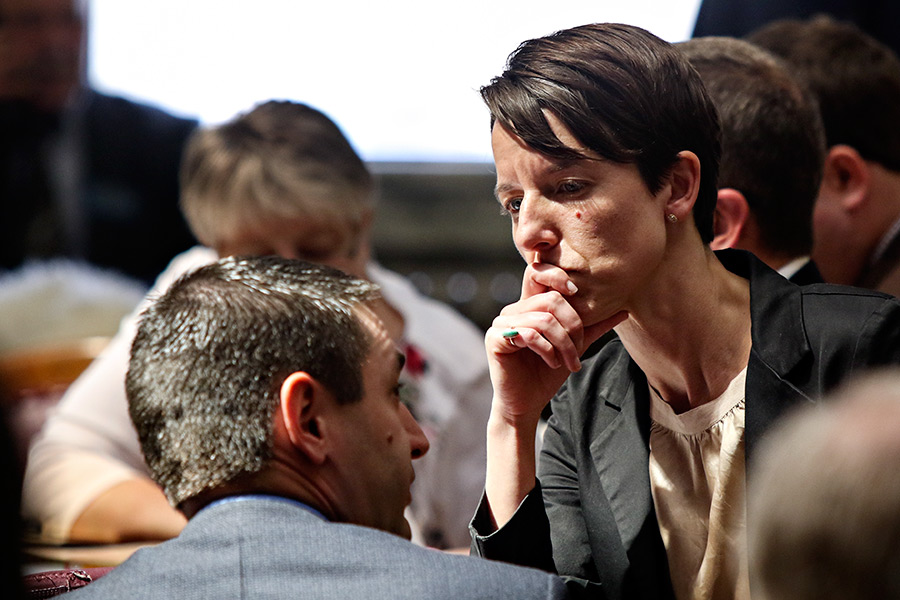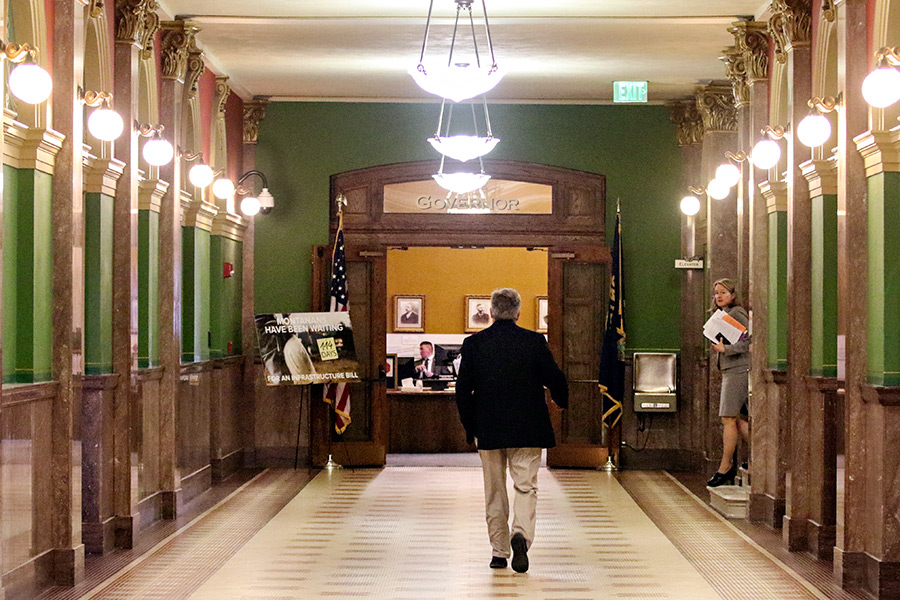HELENA — On the 85th day of the 2017 Montana Legislature, as a cash-strapped session drew to a bitterly familiar close, a handful of House Republican lawmakers gathered in a huddle to hash out what members of both parties recognized as the defining moment in their four months of work — negotiating both a balanced budget and a major infrastructure package to fund critical road, school and building projects across the state.
Just as they had earlier that morning, and just as they would over the coming days, the lawmakers broke from their assembly believing they were on the cusp of a deal, having wrangled enough bipartisan heft to carry the contentious measures across a divided finish line, even as others cleaned out their desk drawers and signed their battered oaken bottoms in farewell tradition, ready to return home to their lives and families.
“I think we’re getting close,” said one of the Republicans, Rep. Frank Garner, of Kalispell. “I would say that people are about where I expected them to be on the 85th day of the session. Tensions are high, but I think we’re close. Then again, I’m a hopeless optimist.”
As the week wore on, Garner’s optimism eroded.
The huddles turned to scrums and erupted in yelling matches between members of party leadership cloistered behind closed doors, out of sight from lobbyists, other lawmakers and the prying ears of reporters. Political gamesmanship and procedural tricks sprang up with metronomic regularity (at one point, the Senate approved a bipartisan effort to leapfrog space and time and advance the session’s calendar one full day in an effort to ramp up pressure on the House and adjourn).
>>>Read What Passed and What Failed
>>>More Photos from the 65th Legislature
“We have gone nose-to-nose on this House floor,” House Majority Leader Ron Ehli, of Hamilton, told the chamber on its final day. “I have had yelling matches in my office with good Republicans on issues that we strongly disagree on. We’ve had tears together.”
Bills were held hostage as bargaining chips to parlay fragile and complex deals, House and Senate rules were suspended to buck procedure, and a defiant House speaker, Rep. Austin Knudsen, R-Culbertson, proved unwilling to concede on key GOP priorities that were non-starters for Democratic Gov. Steve Bullock — namely, abortion, bonding and charter schools.
In the end, no amount of arm-twisting could muster the needed two-thirds majority, or 67 votes, required of any bonding bill, and the state lost out on $80 million in facilities projects for universities, K-12 buildings and a veterans’ nursing home, along with $43 million for regional water projects.
“This was my eighth session and I have never seen so much horse trading back and forth and wrangling over votes for action between legislative leadership and the governor’s office,” said Bob Keenan, R-Bigfork. “It turned into a game of arm-wrestling, and that ended up being what killed the infrastructure projects. [Speaker of the House] Knudsen finally said ‘no deal.’ But those partisan games were in play three months ago.”

Moderate members of the majority Republican Party lamented the 11th-hour handwringing, while outnumbered Democrats railed against conservative GOP lawmakers for attempting to derail the bonding bill for the second session in a row. Democratic Gov. Steve Bullock vetoed an infrastructure bill in 2013. Republicans dismissed the most recent swell of proposed construction as “pet projects” — specifically, a conservative faction of the House GOP opposed $25 million to renovate Romney Hall at Montana State University, $10 million in bridge loans to build the veterans’ home in Butte, $5.4 million to expand the dental hygiene instructional facility at Great Falls College MSU, $5 million to complete a science and technology building at MSU-Billings, and upgrades for K-12 schools across the state.
Outside of Bullock’s second-floor office in the Capitol’s east wing, an easel propped up a sign that read “Montanans Have Been Waiting 113 Days For an Infrastructure Bill,” with a fresh Post-It note denoting the tally of days updated each morning.
“Here we are again trying to solve the most important issues we are tasked with as lawmakers,” Garner said on a day fraught with tension. “When we started the session, everyone said it was going to be all about the budget and infrastructure. And here we are in the waning days without a consensus. At some point, the arm-twisting has got to stop.”
In his second term, Garner, the former Kalispell police chief, has displayed an independent streak that emerged last session when he joined Democrats and a bloc of moderate Republicans to help usher one of the session’s major pieces of legislation through the House — the so-called “dark money” bill that shines sunlight on campaign finance disclosure.
Garner entered the 2017 session intent on raising the gas tax for the first time in 25 years in order to fund critical infrastructure projects, a contentious move for a Republican, but one that gained bipartisan support under Garner’s diplomacy.
In the final weeks of the session, he became instrumental in helping to broker negotiations between House Republicans and the governor’s office.

Although the major infrastructure bill failed, Garner said he’s proud to have successfully sponsored more than a dozen bills that passed into law, the bulk of them focused on public safety, including road and bridge projects that his gas tax bill will help fund, and which Garner said are critical if Montana hopes to curb its highway fatalities and improve its failing roads and bridges.
Still, he said lawmakers need to build consensus before the 2019 session and do more to fund critical infrastructure.
“I’m a career public safety guy, and if we are really serious about this we need to get to work,” he said after the session. “We accomplished a lot of good. We passed a pretty good budget with the resources we had available. But in the end, I’m disappointed we couldn’t pass infrastructure. Make no mistake, in my mind we failed the people of Montana because we couldn’t move the ball forward.”
The final version of the public works bill was a blend of elements contained in two separate bills, both of which included bonding — Senate Bill 367, sponsored by Reps. Mike Cuffe, R-Eureka, and Eric Moore, R-Miles City, which required $80 million in bonding and borrowing authority to finance the slate of local public-works projects and construction of new state buildings on college campuses and elsewhere.
On the final day of the session, Cuffe, who is termed out as a representative after serving four sessions, implored his fellow lawmakers to muster the votes. He said he was crestfallen when it fell short of the necessary two-thirds’ majority required of any bill that authorizes bonding.
“I thought it was a good bill that was well thought out, and I would have been proud for it to have been my final piece of legislation,” Cuffe said.
Rob Cook, R-Conrad, was also instrumental in trying to “flip votes” in the session’s last days, but as some “no” votes turned “yes,” other “yes” votes turned “no,” and the 67 votes proved just out of reach, much to Cook’s chagrin.
“I think we’re the biggest fools in the nation not to vote for bonding right now,” Cook told reporters on the House floor. “But right now it’s a game of attrition and people are ready to go home.”
In all, the House rejected versions of the infrastructure bill six times before giving up and ending the session.
Knudsen blamed Bullock for failing to budge on Republican spending priorities, saying the governor made it clear that Democrats’ agendas trumped the majority party’s.

“I know there is going to be a lot of talk and a lot of spin out there that we didn’t fund any infrastructure, and that’s just simply not true,” Knudsen said. “Overall I am happy that we funded a lot of critical infrastructure.”
Democrat Rep. Jim Keane, D-Butte, in his fifth term in the House after serving four terms in the Senate, said the infrastructure that Republicans agreed to fund consists of local projects and highway construction that is routinely funded every session.
“The Republicans are spinning to you people the lamest excuse out there and you are buying into it,” he said. “All of the money you are talking about, most of it is highway money. We get that all the time.”
Six Flathead County lawmakers voted against the final infrastructure bill on the last attempt, accounting for more than the three-vote margin of defeat — Greg Hertz, R-Polson; Carl Glimm, R-Kila; Randy Brodehl, R-Kalispell; Mark Noland, R-Bigfork; Matt Regier, R-Kalispell; and Derek Skees, R-Kalispell.
After the House subsequently voted 58-42 to adjourn for the session, Bullock held a press conference taking aim at House Republicans who failed to support bonding for major projects.
“It is incomprehensible to me that we walk out of this session again without a general infrastructure bill,” Bullock said at a press conference. “I’m disappointed that some legislators put partisan politics over Montana jobs and the strength of our communities.”
Just as Bullock said at the end of the 2015 session, he warned lawmakers that they would have to answer to their constituents upon returning home, where scores of public works projects would go unfunded.
“Those precluding infrastructure from passing yet again, they don’t need to answer to me,” the governor said. “The Republicans voting against infrastructure need to answer to every contractor in the state and the employees that work for those contractors that expected that they’d get a general infrastructure bill through.”
